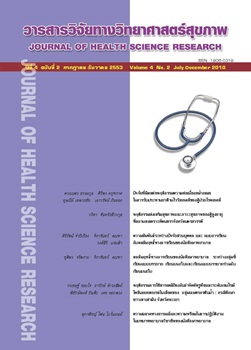ความฉลาดทางอารมณ์และความพร้อมในการปฏิบัติงานในบทบาทพยาบาลวิชาชีพของนักศึกษาพยาบาล
Main Article Content
บทคัดย่อ
บทคัดย่อ
การวิจัยครั้งนี้ เป็นการวิจัยเชิงบรรยาย (Descriptive research) มีวัตถุประสงค์เพื่อศึกษาความสัมพันธ์ระหว่างความฉลาดทางอารมณ์ กับความพร้อมในการปฏิบัติงานในบทบาทพยาบาลวิชาชีพของนักศึกษาพยาบาลชั้นปีที่ 4 ปีการศึกษา 2552 ในวิทยาลัยพยาบาลเครือข่ายภาคเหนือ กลุ่มตัวอย่าง เป็นนักศึกษาพยาบาลชั้นปีที่ 4 ที่กำลังจะสำเร็จการศึกษา ในเดือน มีนาคม ปี พ.ศ. 2553 จากวิทยาลัยพยาบาลเครือข่ายภาคเหนือ จำนวน 190 คน เครื่องมือที่ใช้เป็นแบบประเมินความฉลาดทางอารมณ์ และแบบสอบถามความพร้อมในการที่จะปฏิบัติงานบทบาทพยาบาลวิชาชีพ เครื่องมือดังกล่าวมีค่าความเชื่อมั่นในระดับสูง (r = .87 และ .97 ตามลำดับ) วิเคราะห์ข้อมูลโดยใช้สถิติเชิงพรรณนา และสัมประสิทธิ์สหสัมพันธ์ของเพียร์สัน
ผลการวิจัยพบว่า
1. นักศึกษาพยาบาลส่วนใหญ่ ร้อยละ 57.9 มีความฉลาดทางอารมณ์โดยรวมอยู่ในระดับปกติ
2. นักศึกษาพยาบาลส่วนใหญ่มีคะแนนเฉลี่ยความฉลาดทางอารมณ์ด้านดี ด้านเก่งและด้านสุขอยู่ในระดับปกติ(ร้อยละ 45.3, 74.7 และ 55.8 ตามลำดับ)
3. นักศึกษาพยาบาลมีความพร้อมในการที่จะปฏิบัติงานบทบาทพยาบาลวิชาชีพโดยรวม, ความพร้อมด้านความตั้งใจ มุ่งมั่น และความพร้อมด้านการรับรู้ประสบการณ์ อยู่ในระดับมากที่สุด (ร้อยละ 68.4, 58.4 และ 67.4 ตามลำดับ)มีความพร้อมด้านการเตรียมตัวเกี่ยวกับการทบทวน หาความรู้เพิ่มเติมอยู่ในระดับมาก (ร้อยละ 56.3)
4. ความฉลาดทางอารมณ์รวมทุกด้าน มีความสัมพันธ์ทางบวกกับ ความพร้อมโดยรวมทุกด้าน, ความพร้อมด้านความตั้งใจ มุ่งมั่น และความพร้อมด้านการรับรู้ประสบการณ์ อย่างมีนัยสำคัญทางสถิติที่ระดับ p < .001 (r = .34, .36,.33, ตามลำดับ)
5. ความฉลาดทางอารมณ์ด้านดีมีความสัมพันธ์ทางบวกกับ ความพร้อมโดยรวมทุกด้าน, ความพร้อมด้านความตั้งใจ มุ่งมั่น และความพร้อมด้านการรับรู้ประสบการณ์ อย่างมีนัยสำคัญทางสถิติที่ระดับ p < .001 (r = .25, .32, .24,ตามลำดับ)
6. ความฉลาดทางอารมณ์ด้านเก่ง มีความสัมพันธ์ทางบวกกับความพร้อมในการที่จะปฏิบัติงานบทบาทพยาบาลวิชาชีพโดยรวมทุกด้าน, ความพร้อมด้านความตั้งใจ มุ่งมั่น และความพร้อมด้านการรับรู้ประสบการณ์ อย่างมีนัยสำคัญทางสถิติที่ระดับ .001 (r = .34, .34, .32 ตามลำดับ) และมีความสัมพันธ์ทางบวกกับความพร้อมด้านการเตรียมตัวอย่างมีนัยสำคัญทางสถิติที่ระดับ .05 (r = .15)
7. ความฉลาดทางอารมณ์ด้านสุข มีความสัมพันธ์ทางบวกกับความพร้อมในการที่จะปฏิบัติงานบทบาทพยาบาลวิชาชีพโดยรวมทุกด้าน, ความพร้อมด้านความตั้งใจ มุ่งมั่น และความพร้อมด้านการรับรู้ประสบการณ์ อย่างมีนัยสำคัญทางสถิติที่ระดับ .001 (r = .34, .33, .33 ตามลำดับ) และ มีความสัมพันธ์ทางบวกกับความพร้อมด้านการเตรียมตัวอย่างมีนัยสำคัญทางสถิติที่ระดับ .05 (r = .15)
ผลการศึกษาครั้งนี้แสดงให้เห็นว่านักศึกษาพยาบาลมีความฉลาดทางอารมณ์โดยรวมในระดับปกติและความฉลาดทางอารมณ์มีความสัมพันธ์กับความพร้อมในการที่จะปฏิบัติงานบทบาทพยาบาลวิชาชีพ อาจารย์จึงควรนำข้อมูลไปใช้ในการพัฒนาความฉลาดทางอารมณ์ของนักศึกษา เพื่อที่นักศึกษาจะได้มีความพร้อมในการที่จะปฏิบัติงานบทบาทพยาบาลวิชาชีพต่อไป
Key words: ความฉลาดทางอารมณ์; ความพร้อม; บทบาทพยาบาลวิชาชีพ; นักศึกษาพยาบาล
Abstract
This study was a descriptive study aimedat investigating the relationship between EmotionalQuotient (EQ) and readiness in performingprofessional nursing roles among 4th year nursingstudents. Samples included 190 nursing studentswho were expecting to graduate from nursingcolleges in Northern region of Thailand.Instruments used were an EQ test and aquestionnaire assessing readiness in performingprofessional nursing roles. Both measures hadgood reliability (r = .87 and .97, consecutively)Data were analyzed using descriptive statisticsand Pearson Correlation Coefficient.
The results showed that:
1. The majority of nursing students(57.9%) had Overall EQ at average.
2. Most nursing students had Good EQscore, Smart EQ score and Happy EQ score ataverage (45.3%, 74.7% and 55.8%, consecutively).
3. Most nursing students had the scoresof Overall Readiness, Intention Readiness andExperience-Perception Readiness to performprofessional nursing roles at highest levels (68.4%,58.4, and 67.4, consecutively) and some studentshad the score of Preparation Readiness at a high level (56.3%).
4. Overall EQ score was positivelysignificantly related to the scores of OverallReadiness, Intention Readiness and Experience-Perception Readiness to perform professionalnursing roles at p < .001 (r = .34, .36, .33,consecutively).
5. Good EQ score was positivelysignificantly related to the scores of OverallReadiness, Intention Readiness and Experience-Perception Readiness to perform professionalnursing roles at p < .001 (r = .25, .32, .24,consecutively).
6. Smart EQ score was positivelysignificantly related to the scores of OverallReadiness, Intention Readiness and Experience-Perception Readiness to perform Professionalnursing roles at p < .001 (r = .34, .34, .32,consecutively) and was positively significantlyrelated to the score of Preparation Readiness atp < .05 (r = .15).
7. Happy EQ score was positivelysignificantly related to the scores of OverallReadiness, Intention Readiness and Experience-Perception Readiness to perform professionalnursing roles at p < .001 (r = .34, .33, .33,consecutively) and was positively significantlyrelated to the score of Preparation Readiness atp < .05 (r = .15).
The study results revealed that nursingstudents had EQ score at average. There was arelationship between EQ and readiness inperforming professional nursing roles. Instructorsmay apply these findings in developing EQ ofnursing students in order to prepare them to beready to perform professional nursing roles in the future.
Key words: Emotional Quotient (EQ); readiness; professional nursing role; nursing student
Downloads
Article Details
บทความที่ได้รับการตีพิมพ์เป็นลิขสิทธิ์ของวิทยาลัยพยาบาลบรมราชชนนี จังหวัดนนทบุรี
ข้อความที่ปรากฏในบทความแต่ละเรื่องในวารสารวิชาการเล่มนี้เป็นความคิดเห็นส่วนตัวของผู้เขียนแต่ละท่านไม่เกี่ยวข้องกับวิทยาลัยพยาบาลบรมราชชนนี จังหวัดนนทบุรี และคณาจารย์ท่านอื่น ในวิทยาลัยฯ แต่อย่างใด ความรับผิดชอบองค์ประกอบทั้งหมดของบทความแต่ละเรื่องเป็นของผู้เขียนแต่ละท่าน หากมีความผิดพลาดใด ๆ ผู้เขียนแต่ละท่านจะรับผิดชอบบทความของตนเองแต่ผู้เดียว


